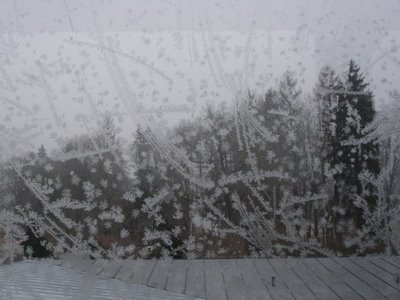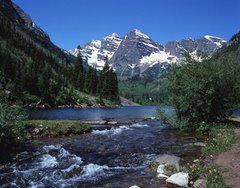Saturday, October 09, 2010
The Kitchen Chimney
Posted by
Bruce
at
10/09/2010 11:42:00 am
![]()
Saturday, October 02, 2010
The Glory of God Has Only
Note: All quotes taken from the New Living Translation Second Edition.
Posted by
Bruce
at
10/02/2010 03:35:00 pm
![]()
Labels: Articles
Friday, September 24, 2010
Now Close the Windows
 Now close the windows and hush all the fields:
Now close the windows and hush all the fields:If the trees must, let them silently toss;
No bird is singing now, and if there is,
Be it my loss.
Robert Frost --- Now Close the Windows
Posted by
Bruce
at
9/24/2010 10:00:00 am
![]()
Friday, September 17, 2010
Who Was Actually Responsible For Jesus Death
Posted by
Bruce
at
9/17/2010 11:39:00 am
![]()
Labels: Articles
Wednesday, December 31, 2008
An Old Man's Winter Night
 All out of doors looked darkly in at him
All out of doors looked darkly in at himThrough the thin frost, almost in separate stars,
That gathers on the pane in empty rooms.
What kept his eyes from giving back the gaze
Was the lamp tilted near them in his hand.
Robert Frost --- An Old Man's Winter Night
Posted by
Bruce
at
12/31/2008 07:49:00 am
![]()
Monday, December 29, 2008
In Considering The Characteristics of God
would your list include that of FIRE? Probably not! However, it could be argued that FIRE is central to God’s manifested nature. In the Scriptures the Lord is often mentioned in tandem with FIRE.
God initially introduced himself to Moses by appearing "to him in a blazing FIRE from the middle of a bush" (Ex. 3:2). Later when the Egyptians were pursuing Israel the Lord "looked down on the Egyptian army from the pillar of FIRE and cloud, and he threw their forces into total confusion" (Ex 14:24).
Throughout Israel's years of wandering in the wilderness God revealed himself through FIRE. At Mount Sinai the Lord descended upon the mountain in FIRE along with smoke and an earthquake (see Ex 19:18). Moses describes God's glory as appearing "like a consuming FIRE" (Ex 24:17) and his jealousy as "a devouring FIRE" (Deu 4:24). We are reminded to worship the Lord in holy fear and awe because "our God is a devouring FIRE" (Heb 12:29).
Let’s consider the Bible’s physical description of the Lord. Ezekiel depicts his appearance as follows "From what appeared to be his waist up, he looked like gleaming amber, flickering like a FIRE" (Ezk 1:27). John describes Jesus as having eyes that"are like flames of FIRE" (Rev 2:18).
The Lord's court is one of FIRE. Ezekiel describes God's holy mountain as being "stones of FIRE" (Ezk 28:14). In a vision Daniel saw the Ancient One sitting on "a FIERY throne with wheels of blazing FIRE" from which came "a river of FIRE"(Daniel 7:9-10). In the vision John received from the Lord he saw "what seemed to be a glass sea mixed with FIRE" (Rev 15:2). Finally, the living beings who attend the Almighty are described as " bright coals of FIRE" (Ezk 1:13). In fact, all the angels of God are described as being "servants like flames of FIRE” (Heb 1:7). Their face’s are like the sun, and feet like pillars of FIRE" (Rev. 10:1). God has a standing army of horses and chariots of FIRE” (2 Kings 6:17). It must have been one of these chariots that took Elijah up to heaven (2 Kings 2:11).
The Holy Spirit is also described in terms of FIRE. At Pentecost God sent the Spirit to fill and give spiritual gifts to those believers who were gathered in an upper room. In this anointing the Spirit appeared "like flames or tongues of FIRE” (Acts 2:3).
In the future FIRE will be prominent. At the "Judgment Seat of Christ" he will use a purging FIRE to "reveal what kind of work” (1 Cor 3:13) believers have done during their earthly pilgrimage. At the "Great White Throne" judgment unbelievers will experience the blazing FIRE of Christ's anger when He condemns them to the lake of FIRE (Rev 20:15) a place where "the FIRE never goes out" (Mark 9:48).
Not only is humanity going to experience God's "FIRE" but the heavens and earth will also be destroyed by FIRE right down to their most basic elements after which the Lord will put in place a new heavens and earth (see 2 Peter 3:12,13).
FIRE and God are inseparable. FIRE has the power to destroy or it has the power to refine and make pure. The pertinent question we must all consider becomes: how will the FIRE of God touch us?
Note: All quotes taken from the New Living Translation Second Edition
Copyright. Bruce December 2008
Note: All quotes taken from the New Living Translation Second Edition.
Posted by
Bruce
at
12/29/2008 06:23:00 pm
![]()
Labels: Articles
Tuesday, October 30, 2007
Aquainted With The Night
I have outwalked the furthest city light.
Robert Frost --- Aquainted With The Night
Posted by
Bruce
at
10/30/2007 07:28:00 pm
![]()


